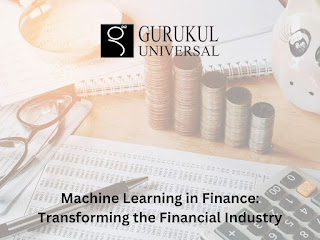Machine learning, a subset of artificial intelligence, has emerged as a transformative force in various industries, and the financial sector is no exception. Implementing machine learning in finance has revolutionized traditional practices, unlocking unprecedented opportunities for data-driven decision-making and enhanced customer experiences. This article explores the profound impact of machine learning in finance, shedding light on its applications, benefits, and challenges as it reshapes the financial industry.
1. The Rise of Machine Learning in Finance
Machine learning's rise in finance can be attributed to its ability to analyze vast datasets and extract valuable insights with exceptional speed and accuracy. Machine learning is reshaping every facet of the financial industry, from risk management and fraud detection to investment strategies and personalized financial services.
2. Automated Trading and Portfolio Optimization
Machine learning algorithms have proven instrumental in automating trading processes and optimizing investment portfolios. These algorithms can analyze historical market data, identify patterns, and make real-time trading decisions, improving efficiency and minimizing human biases.
3. Fraud Detection and Cybersecurity
Financial institutions face constant threats from fraudsters and cybercriminals. Machine learning enables the development of sophisticated fraud detection systems that can analyze transaction patterns and detect anomalies, enhancing the security of digital transactions.
4. Credit Risk Assessment and Loan Underwriting
In credit risk assessment and loan underwriting, machine learning models can assess borrowers' creditworthiness more accurately by considering multiple variables and historical data. This results in more informed lending decisions and reduced default rates.
5. Customer Personalization and Engagement
Machine learning algorithms enable financial institutions to provide personalized recommendations and offerings to customers based on their economic behaviour and preferences. This level of personalization enhances customer engagement and fosters long-term loyalty.
6. Natural Language Processing in Finance
Natural Language Processing (NLP) has transformed how financial institutions process textual data, such as news articles and social media sentiment. NLP-powered algorithms can extract relevant information, sentiments, and market trends from unstructured data, enabling more informed decision-making.
7. Regulatory Compliance and Anti-Money Laundering
Machine learning aids financial institutions in complying with regulatory requirements and detecting suspicious activities related to money laundering. These algorithms can analyze large volumes of transactions and identify patterns indicative of illicit activities.
8. Challenges and Ethical Considerations
The adoption of machine learning in finance is challenging. Concerns related to data privacy, biases in algorithms, and interpretability of AI-driven decisions demand careful consideration and proactive measures to ensure the ethical and responsible use of machine learning.
9. The Future of Machine Learning in Finance
As technology evolves, machine learning's role in finance will expand. With advancements in deep learning, reinforcement learning, and explainable AI, financial institutions will benefit from even more powerful and trustworthy AI solutions.
Machine learning has ushered in a new era for the financial industry, empowering institutions to make data-driven decisions, improve customer experiences, and mitigate risks. From automating trading strategies to enhancing fraud detection and personalizing financial services, machine learning's applications in finance are far-reaching and transformative. However, as the financial industry embraces this cutting-edge technology, it must navigate ethical considerations and address potential challenges to ensure responsible and transparent AI practices. With continued research and accountable implementation, machine learning will continue to transform the financial landscape, fostering innovation, efficiency, and trust in the industry for years to come.


